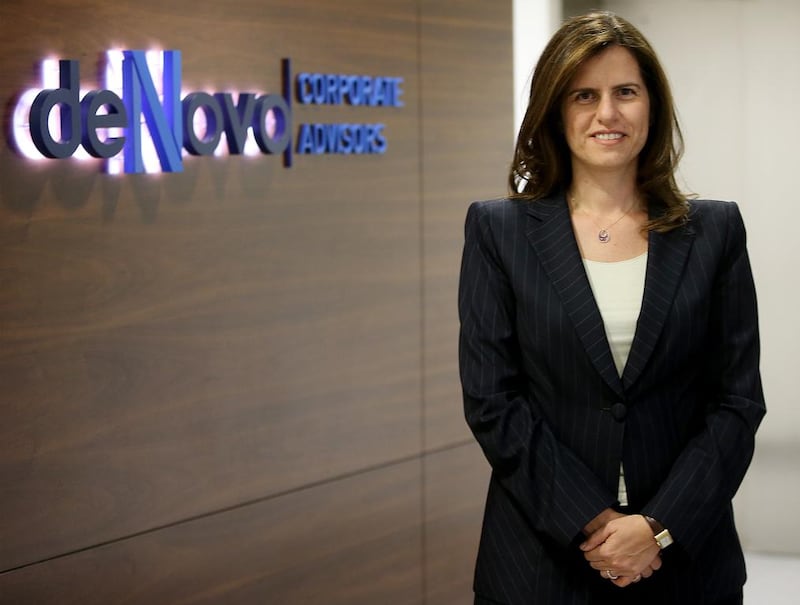It was, according to May Nasrallah, “the hardest decision of my life”.
The year was 2009, a year or so into the global financial crisis. Ms Nasrallah, who had left her native Lebanon to finish her education in Kuwait and the United States, then spent 16 years in increasingly senior positions across the globe with Morgan Stanley, the US “bulge bracket” bank, ending up as founder of the firms’s investment banking business in the Middle East.
Then came the crisis, and the banking climate in the region changed. It became a survival fight for all the investment banks, Morgan Stanley included.
“The region always had some permanent attractions as a source of capital and in cross-border business, but the big multibillion-dollar international transactions weren’t as abundantly there any more post-crisis,” she recalls.
At the same time she was presented with a new personal opportunity. “For the year before 2009 I had been getting approached by medium-sized companies and family groups across the region that needed advice on mergers, disposals or restructuring work. But MS’s focus was on larger transactions.
“I saw a gap in the market for entities that were not getting adequately served by the bulge-bracket global institutions. These were relatively smaller companies than the ones I dealt with at MS, but they were nevertheless meaningful in size and represented the nuts and bolts of the regional economy,” she explains.
This is how deNovo Corporate Advisors, the Dubai-based firm of which she is currently chief executive, was born.
“What capital did I have to start deNovo? You’re looking at it. I had my personal capital and my reputation. The biggest challenge in the first place was to attract the right kind of talent to the firm. The aim was to differentiate from other firms out there, but provide the same kind of high quality execution as MS.
“So in 2009 it was just me, but we quickly grew to double digits and soon there will be 18 people in the firm. In four years we’ve been lucky enough to attract a team of highly talented professionals with global experience,” she explains.
The “tombstone” awards on her desk high in the Emirates Towers office block give a flavour for the kind of work she has been doing since then.
Her firm advised Invest AD, the Abu Dhabi firm, on disposing of some private equity assets, including the unit responsible for the Red Bull and San Pelligrino drink franchises in the UAE, sold to a Kuwaiti firm; she has advised on others deals involving Saudi, Bahraini and US companies.
A healthy chunk of her business at deNovo comes from referrals from her previous contacts at the big firms, like Morgan Stanley, Goldman Sachs and Credit Suisse, as well as international and regional law firms. “I know them and they know deNovo, they know we are a really capable team,” she says.
The new firm offers the full range of “boutique” corporate advisory work. “We are a generalist organisation but with some specific specialities.
“For example, we have in-house financial institution expertise and M&A [mergers and acquisitions] and industrials specialist skills. Although M&A constitutes the majority of our business, we also do private placements, preparation for initial public offerings [IPOs], restructurings and risk management. And we have the capability to structure transactions in a Sharia-compliant way,” says Ms Nasrallah.
The UAE and regional economies have recovered, of course, especially over the past two years, but there is a perception that the financial sector has lagged behind. Regional stock markets have picked up, but the flood of IPOs on to local markets has not materialised.
She believes there has been a qualitative effect from the global crisis: “The region is still deep-pocketed, cash-rich and acquisition-minded again, but it hasn’t gone back to the pre-crisis levels. Today, there are not a lot of people doing lots of big things, but there are a number of people doing some smaller things.”
There are reasons local markets have not yet experienced a more dynamic recovery. “Some corporates are going to London for their IPOs to capture the perceived liquidity in that market. I personally believe there is good liquidity available in the regional markets, and in fact the overperformance of equity markets such as the UAE in the past year should be encouragement for local listings this coming year.
“The regional complications of the Arab Spring has in some ways been positive for Dubai and the UAE, but you’d have to be very strong-hearted to say you could predict how it was all going to pan out in the end. The region needs stability, and there is still a nervousness about it,” she believes.
“I think the biggest single issue for local markets is that they haven’t had large government-related entity IPOs. Some are rumoured to be on the way. I think there has been a reluctance historically by the owners to be seen to be selling their jewel assets too cheaply. Hopefully we will see a change to this in 2014.”
If so, and if deNovo keeps working away at the “nuts and bolts” of the regional economy, there is no limit to Ms Nasrallah’s ambition. “I think we have the capacity to be a future Rothschild or Lazard of the Middle East,” she says.
fkane@thenational.ae





